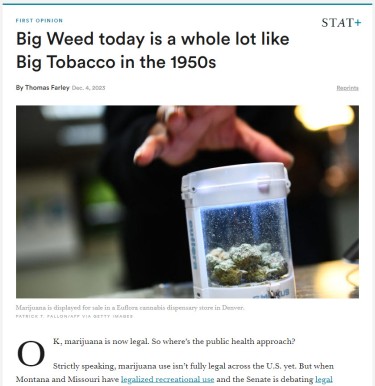Is “Big Marijuana” really a thing, and is it Tobacco 2.0?
Personal experience powerfully programs our perspectives, often limiting objectivity on complex issues through confirmation bias. We unconsciously cherry-pick validating data to sustain internal narratives while ignoring contradictions causing cognitive dissonance.
This neurobiology explains the enduring futility of debates – discussing subjective qualia comparing limitless inner universes often devolves into discord. Belief calcifies position.
Nowhere does this play out more clearly than drugs policy discourse. The same statistics yield entirely conflicting conclusions depending on interpreter bias. Dry data morphs malleably serving agenda.
Hence in assessing perspectives, understanding personal incentives illuminating stance helps contextualizing arguments. Rather than debating interpretations, discern integrity of interpretation.
With this spirit of seeking higher truth, today we will critique a medical doctor’s opinion column opposing cannabis normalization by spotlighting recreational regulations ignoring public health.
While raising valid ethical points from his premise, prohibitionist assumptions negate discussing drug policy objectively. So we must evaluate lens rather than conclusions. Therein wisdom unfolds.
By illuminating inability seeing beyond bias, perhaps improved collective understanding emerges. The plants beckon beyond politicized rhetoric towards rooted truth.
His doctor rails against the public health impacts of for-profit recreational cannabis markets adopting predatory corporate tactics akin to 20th century’s tobacco industry playbook. Let’s examine his main points:
-
America moves rapidly toward nationwide legal access, yet regulations prioritize commercial interests over public welfare through lobbying, resembling alcohol and tobacco corruption escaping responsibility for widespread addiction and death previously.
-
The burgeoning cannabis industry now utilizes similar manipulative marketing ploys to expand usage, manufacturing consent bypassing ethical considerations. Tactics include misleading health benefit claims, relentlessly pushing ever-higher potency products, deceptive advertising masked as public education, regalia attracting youth, and aggravating mental illness risks.
-
Spiraling innovation manifests constantly new high-inducingforms like waxes, mints and lubricants for intensifying addictive dependencies. Lack of safety vetting or dosing consistency regulation raises acute toxicity and long-term medical complication possibilities resembling disastrous pharmaceutical epidemics but for a far less studied compound.
-
Massive corporate consolidation mirrors Big Tobacco’s profiteering playbook, extracting every advantage by hooking customers then denying culpability for destruction left in business model wake. Yet beyond marketing, true production costs for cannabis approximate pennies on retail’s dollar. This imminent nuevo-capitalist behemoth must face checks before morphing monstrous.
In summary, this doctor foresees public health calamity looming as cash-hungry cannabis commodifies previously safeguarded cognitive territories through influences impossible walking back once normalized, however convincing initial free market arguments. Just witness opioid tragedies. Hence the doctor advocates regulating cannabis under tobacco rather than alcohol policy to place health before wealth.
While clearly written in good faith out of genuine care for people’s welfare, glaring logical leaps beg addressing towards fully understanding all factors at play. Now we explore deeper…
While this doctor raises thoughtful concerns warranting discussion, several glaring logic leaps require addressing. Most problematic, none of the supposed public health threats named materialized so far where adult-use laws passed, making the dire forecasts speculative fiction. Real data soundly refutes assumptions.
Firstly, the cannabis industry operates nothing like predatory pharmaceutical tactics – if anything, persistent stigmatization and disproportionate taxation makes running sustainable ethical businesses challenging against illicit markets dancing regulatory obstacles. Idea of vulnerable minds preyed upon by suited cannabusinessmen ignores on-the-ground realities.
Equally faulty, the doctor ambiguates all marketing as insidious manipulation rather than below-the-line brand differentiation natural for any competitive sector. Silly to suggest every label makes health claims or targets kids. Reasonable regulations already govern most jurisdictions successfully. This is commerce, not coercion.
Also, the increased concentrate potency argument ignores consumer demand driving innovation. Equating higher THC levels with deadlier drugs contradicts science. Responsible personal liberty means informed adults freely modulating experiences, not universal standard dosing. Most eschew highest potencies after experimentation. Mortality remains nonexistent despite specters raised.
Next comparing cannabis to tobacco’s generational carnage ignores profound differences – smoking introduces combustion carcinogens where little exist ingesting otherwise. Meanwhile tobacco lacks cannabis’ extensive neuroprotective and wellness utilities backed by data. Conflating both plants under “smoke” epitomizes laziness serving narrative. Education counters alarmism.
Most concerning, suggesting quasi-prohibitionist strictures around packaging, retail density, home delivery etc overlooks the stubborn perseverance of legacy criminal elements without legal market competitiveness. Implementing high friction against fledgling businesses directly gifts the illicit industry enduring enterprise share while stymying access.
If public health prioritizes stopping lethal bleeding like fentanyl infiltration, tightly controlling cannabis proves exactly wrong tack. Keeping cultivation local sustains quality and origins. Unfortunately old models die hardest, especially when steeped in reefer madness goggles. But the doctor’s heart stays true if misled.
While public health arguments deserve airing to avoid policy pitfalls, we must acknowledge the outsized influence of doctors in shaping drug perceptions despite firsthand blind spots. This prohibitionist op-ed typifies clinical cannabis commentary cross-eyed by reefer madness precedent not data. And the public deserves our most informed opinions, not residual bias.
Conflating cannabis with far cruder intoxicants ignores profound differences in effects and mortality due to unique chemistry mods unseen elsewhere. Equally listing tobacco ignores not only combustion byproduct discrepancy but null medical utility contrasting cannabis’ extensive research confirming wellness benefits. This sloppy categorization serves agenda more than truth.
If any drug warrants such generous assessment, cannabis proves quintessential. Beyond constituent complexity and synaptic modulation, recorded use over millennia established unparalleled cultural ritual tradition and safety no other compound approaches. These layered nuances demand appropriately customized regulations aligning commerce pragmatics with community health.
Blanket prohibitions historically breed catastrophe through surrendering control authority cannot reclaim. Realities rule over idealism. Hence wise policy navigates human nature’s inevitability seeking altered states while channeling impulses towards responsibility, not demonization. Just results place people’s welfare before optics. But change takes courage commodified systems lack incentive supporting.
Doctors afraid of their own shadows in this arena require deeper introspection regarding irrational hesitancies delaying compassionate change. Because beyond branding bogeymen, the public recognizes fear itself fuels Contradiction most preventing reconciling cannabis fully into legal normalcy ultimately benefiting all. What resistance truly roots below denial against accepting higher paths?
IS CANNABIS BIG TOBACCO 2.0? READ ON..
IS THE CANNABIS INDUSTRY BIG TOBACCO 2.0? CLICK HERE!
- SEO Powered Content & PR Distribution. Get Amplified Today.
- PlatoData.Network Vertical Generative Ai. Empower Yourself. Access Here.
- PlatoAiStream. Web3 Intelligence. Knowledge Amplified. Access Here.
- PlatoESG. Carbon, CleanTech, Energy, Environment, Solar, Waste Management. Access Here.
- PlatoHealth. Biotech and Clinical Trials Intelligence. Access Here.
- Source: http://cannabis.net/blog/opinion/is-the-marijuana-industry-just-like-big-tobacco-in-the-1950s-expublic-health-commissioner-sound.926504






